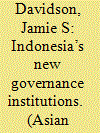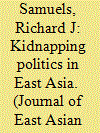| Srl | Item |
| 1 |
ID:
146901


|
|
|
|
|
| Summary/Abstract |
This article argues that the primary obstacle to the independence of Indonesia’s new reform-oriented governance institutions is the extent to which foreign interests have a stake in their formal decisions. They appear to regulate or adjudicate according to rules, in Indonesian-on-Indonesian disputes. When a foreigner-versus-Indonesian pairing is at hand, domestic vested interests tend to prevail.
|
|
|
|
|
|
|
|
|
|
|
|
|
|
|
|
| 2 |
ID:
100263


|
|
|
|
|
| Publication |
2010.
|
| Summary/Abstract |
In this article, I examine two contemporary cases in which the same foreign adversary, North Korea (DPRK), violated the sovereignty of neighboring states. I use a comparison of South Korean and Japanese reactions to political captivity to assess institutional performance in democratic states and ways in which these dynamics are connected to international politics. We see how "captivity narratives" can be differentially constructed and deployed and how policy capture can be achieved by determined political actors. Civic groups in both countries worked to mobilize political support, frame the issue for the media, and force policy change. In Japan, politicians were more willing to use the abduction issue for domestic political gain than in Korea, where the political class was determined to prevent human rights issues (including abductions) from interfering with their larger political agenda, including improved relations with the DPRK.
|
|
|
|
|
|
|
|
|
|
|
|
|
|
|
|
| 3 |
ID:
139586


|
|
|
|
|
| Summary/Abstract |
Social legitimacy is central to the effectiveness of international organisations (IOs). Yet, so far, we have little systematic knowledge about what drives citizens to support or oppose IOs. In this article, we isolate and assess three alternative explanations of social legitimacy in global governance, privileging interest representation, institutional performance, and confidence extrapolation. We test these theories in a multilevel analysis of citizen confidence in the United Nations (UN) using World Values Survey and European Values Study data, supplemented by contextual measures. The results grant support to the arguments that institutional performance and confidence extrapolation shape popular confidence in the UN, while offering little support for the explanation of interest representation. These findings challenge the predominant understanding that more democratic procedures lead to greater social legitimacy for IOs. Instead, the UN case suggests that the social legitimacy of IOs is based primarily on the organisations' capacity to deliver, as well as on citizens' general confidence in political institutions, which IOs may have little to do with and can do little to change.
|
|
|
|
|
|
|
|
|
|
|
|
|
|
|
|